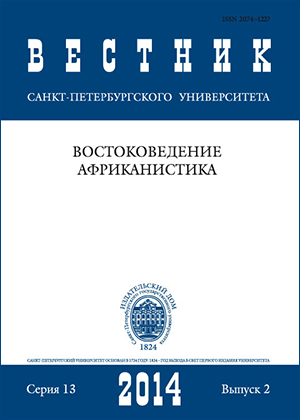Sanskrit literature of Cambodia
Abstract
Sanskrit literature in Cambodia is presented in epigraphic inscriptions placed on the walls of palaces and temples and on steles. Epigraphy is a wide topic. In Russian oriental studies, though, this topic remains unexplored. There are only some mentions of it in works on Cambodian history or literature. And yet it has a considerable significance for the studies of Khmer culture in general and their literature in particular. Inscriptions are written in verse. Their size varies between 10–15 and 100 stanzas. Their topics are praise of gods and kings, information of kings’ victories in battles, sometimes accounts of kings’ genealogies, as well as about erection of temples, sculptures of gods, depictions of some aspects of social life. Inscriptions as works of literature are specific, therefore they deserve studying. The article presented here shows the character of this type of khmere literature. The main part of it, i.e. pp. 3–8, features extracts from/samples of a number of inscriptions translated by the article’s author. Refs 3.
Keywords:
panegyric, eulogy to kings, praise of gods, mythology and religion, Teaching, Law, Dharma, Torah, Hinduism, living being, the Indian humanities, influence of Indian culture and literature, extracts from / samples of texts, image, metaphor
Downloads
References
Downloads
Published
How to Cite
Issue
Section
License
Articles of "Vestnik of Saint Petersburg University. Asian and African Studies" are open access distributed under the terms of the License Agreement with Saint Petersburg State University, which permits to the authors unrestricted distribution and self-archiving free of charge.





